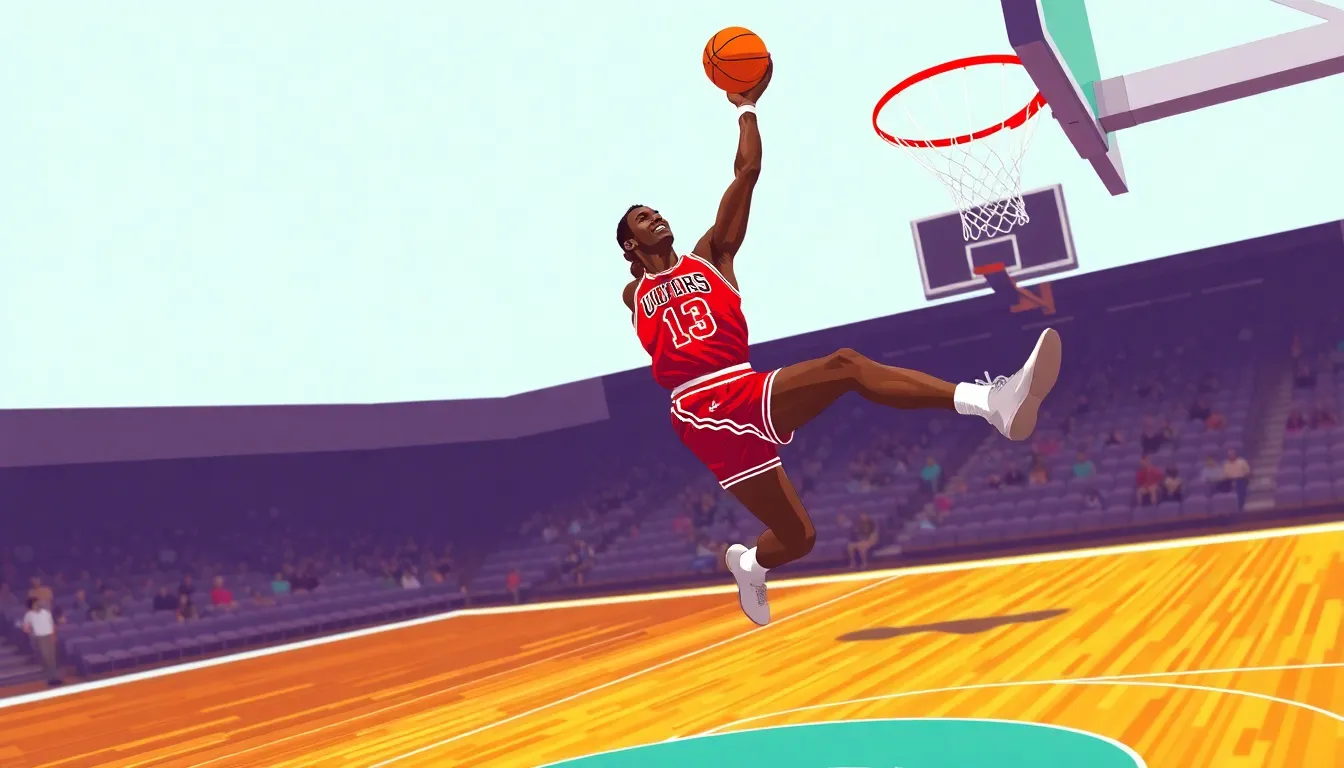Wilt Chamberlain was a basketball legend whose name is synonymous with greatness. Known for his incredible scoring ability and larger-than-life personality, he dominated the court like few others ever have. But even the mightiest warriors must eventually hang up their sneakers. Fans often wonder when this titan of the game decided to call it quits.
Table of Contents
ToggleOverview Of Wilt Chamberlain’s Career
Wilt Chamberlain’s career is marked by extraordinary achievements and memorable moments. He entered the NBA in 1959, quickly establishing himself as a dominant force on the court. Over 14 seasons, he played for the Philadelphia/San Francisco Warriors, Philadelphia 76ers, and Los Angeles Lakers.
Statistically, he averaged 30.1 points and 22.9 rebounds per game, showcasing unmatched scoring ability. His most famous game occurred on March 2, 1962, when he famously scored 100 points against the New York Knicks, a record that persists to this day.
Chamberlain’s influence extended beyond just points; he changed the way basketball was played. His size and agility transformed the center position, compelling teams to adapt their strategies. Additionally, he received numerous accolades, including four MVP awards and two NBA championships.
Though he faced fierce competition, including legends like Bill Russell, Wilt maintained a unique presence in the league. His personality, flashy style, and on-court performance captivated fans, turning him into a cultural icon.
Retirement from basketball came in 1973 after playing his final game with the Lakers. His decision marked the end of an era, leaving an indelible mark on the sport. Players and fans continue to remember Chamberlain’s contributions as they honor his legacy in basketball history.
Key Milestones In Chamberlain’s Career

Significant achievements defined Wilt Chamberlain’s career during his time in basketball. His journey includes memorable moments and record-setting performances that cemented his legacy.
College And Early Years
Chamberlain attended the University of Kansas, where he played for the Jayhawks from 1956 to 1958. He earned All-American honors and led his team to the NCAA Championship Game in 1957. His college career showcased his immense talent, as he averaged 30.1 points and 18.0 rebounds per game. In 1958, he declared for the NBA Draft, where the Philadelphia Warriors selected him, marking the beginning of his professional journey.
Professional Achievements
Chamberlain’s professional career began in 1959, quickly transforming him into one of the NBA’s greatest players. He averaged 30.1 points and 22.9 rebounds per game over 14 seasons. Notable achievements include four MVP awards and two NBA championships. His most iconic performance occurred on March 2, 1962, when he scored 100 points in a single game, a record that remains unmatched. The impact of his scoring and rebounding changed strategies across the league, ensuring his status as a basketball legend.
The Retirement Announcement
Wilt Chamberlain retired in 1973, concluding an illustrious career that redefined basketball. He announced his retirement after his last game with the Los Angeles Lakers, leaving behind an unmatched legacy.
Date And Context
March 1973 marked the end of Chamberlain’s professional basketball career. His final game transpired on April 2, 1973, against the New York Knicks. By the end of his season, he chose to retire amidst ongoing health concerns, including knee issues. This decision resonated with many fans who had witnessed his incredible journey in the NBA.
Reactions From Peers And Fans
Chamberlain’s retirement elicited mixed emotions among basketball peers and fans alike. Numerous players expressed respect for his contributions to the game. Legends like Bill Russell regarded him as a fierce competitor and transformative figure in basketball. Fans celebrated his monumental achievements and the unforgettable moments he created. Many felt a deep sense of loss, recognizing that the game had lost one of its greatest icons.
Impact Of Chamberlain’s Retirement
Wilt Chamberlain’s retirement marked a significant turning point in basketball history. His departure left a void that profoundly affected the sport.
Legacy In Basketball
Chamberlain’s legacy remains unparalleled within the NBA. He set records that continue to challenge players today, including his 100-point game, a feat unmatched in professional basketball. His dominance not only included scoring; he also excelled in rebounding, averaging 22.9 rebounds per game. These accomplishments established him as a standard against which future players measure success. Recognition of his impact includes his induction into the Naismith Memorial Basketball Hall of Fame in 1979. Many consider his innovative style transformed the game, paving the way for future big men.
Influence On Future Generations
Future generations of players draw inspiration from Chamberlain’s accomplishments. His gameplay emphasized not just scoring but also versatility and athleticism. Aspiring athletes look up to his work ethic as a foundational element of his success. Coaches often reference Chamberlain’s ability to change game dynamics when training players. The evolution of the center position largely stems from his influence, encouraging new strategies and styles. Ultimately, Chamberlain’s impact resonates through current NBA stars who strive to emulate his greatness.
Wilt Chamberlain’s retirement in 1973 marked the end of an era in professional basketball. His extraordinary talent and record-breaking achievements left an indelible mark on the sport. As fans and players alike reflect on his contributions, it’s clear that Chamberlain’s legacy continues to inspire future generations.
The void left by his departure is still felt today, as his records challenge modern players. His influence on the game reshaped the center position and set a standard for excellence that remains unmatched. Chamberlain’s story is a testament to the impact of one individual on a sport, ensuring that his memory will forever be celebrated in the annals of basketball history.




